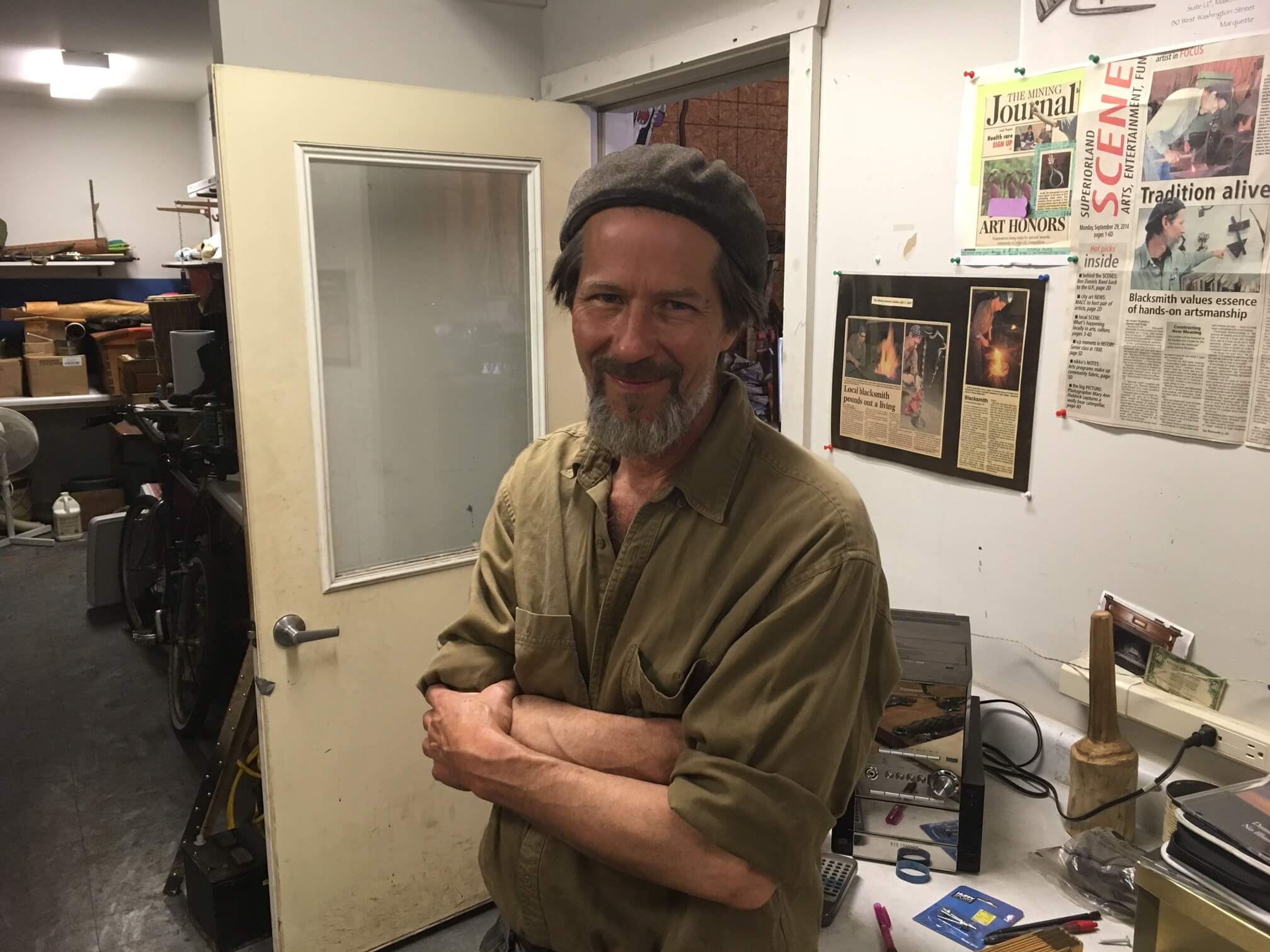GORDON GERHART IS a throwback, from way back.
From, say, the 19th century, or the 18th century. Or earlier.
He’s a fulltime blacksmith, plying his trade in the heart of Marquette five days a week, sometimes seven days a week.
“I’m happiest when I’m making something,” he tells you between mighty swings with his hammer at a red-hot iron rod. The sparks fly.
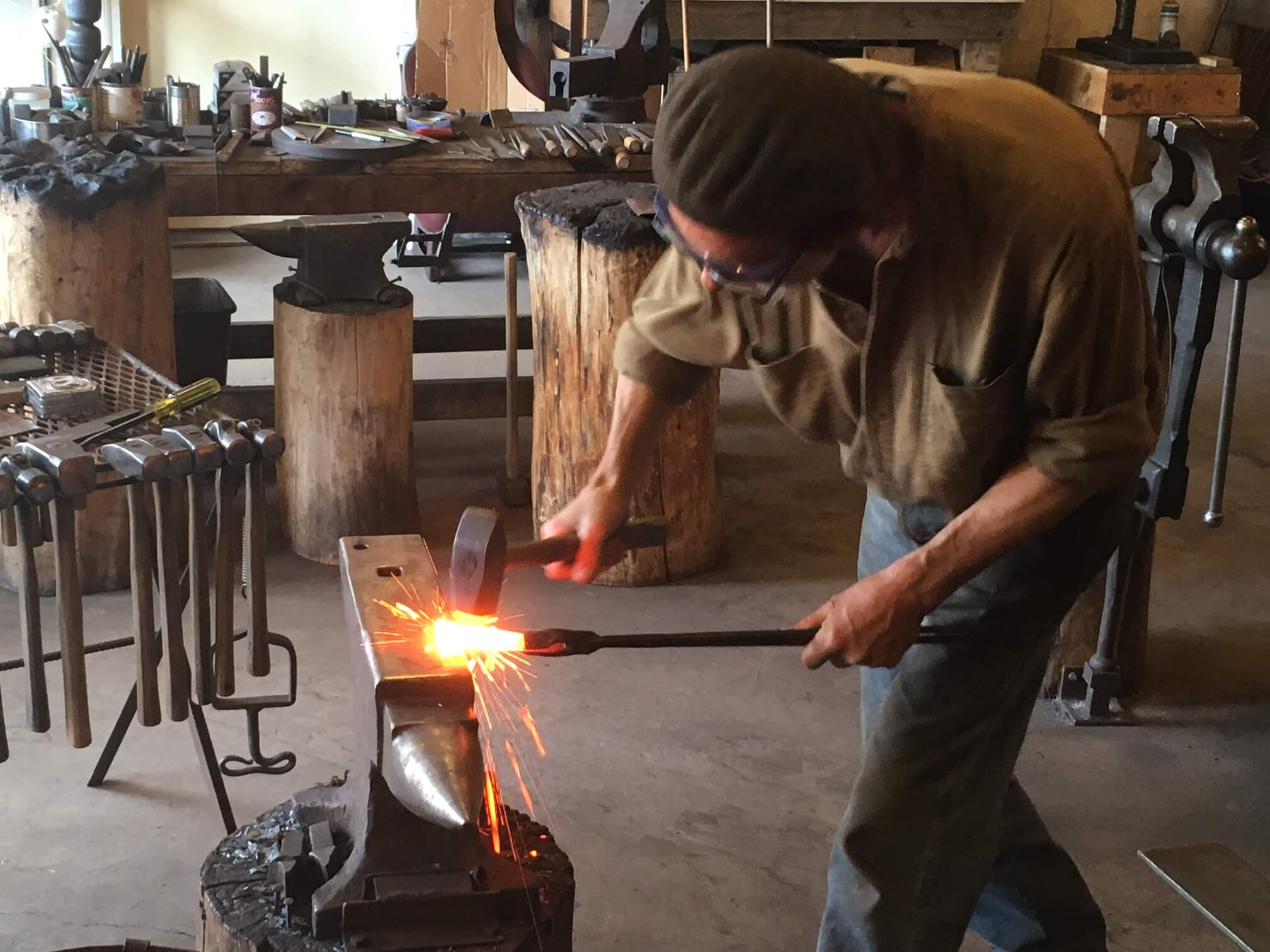
For the last decade, he’s worked out of a high-ceiling warehouse just off the bike path. Mostly alone. For company, he’s got his forge, his hammer, his anvil, his coke (processed coal), an assortment of shaping instruments, and a supply of iron waiting to be transformed into something handsome or functional, or both.
Gearhart’s other indispensable tools are a keen eye, a flair for the creative, a strong arm, and a remarkable muscle memory that enables the high-swinging hammer to land exactly where he wants it every single time.
A computer for his shop? No, he doesn’t need one.
How about a website to advertise and market his business? Nah. “I just never got around to doing it,” he says. “People have offered to help me with a website but I’ve never taken that step.”
He’s lean and dark-haired, with a salt-and-pepper beard, almost always with a cap on his head but perhaps his most remarkable feature is his ever constant smile. He’s a man who looks at peace with himself, his work, his life.
He was born 56 years ago in Beaver Falls, Pennsylvania, and raised in Poland, Ohio, just outside of Youngstown, a city built on steel. His mother stayed at home with the kids but Dad was a manufacturing rep for the steel companies. Gordon’s eventual choice of professions is starting to make sense.
“Even when I was boy, I liked making things, carving boats out of wood,” he explains. “I had a big interest in knives…in the steel and the bone. Maybe I got it from TV and cowboy movies.” Here he breaks into a broad smile just before he slips the rod that he’s working on into the bed of coke. The coals register at about 2600 degrees Fahrenheit, he says.
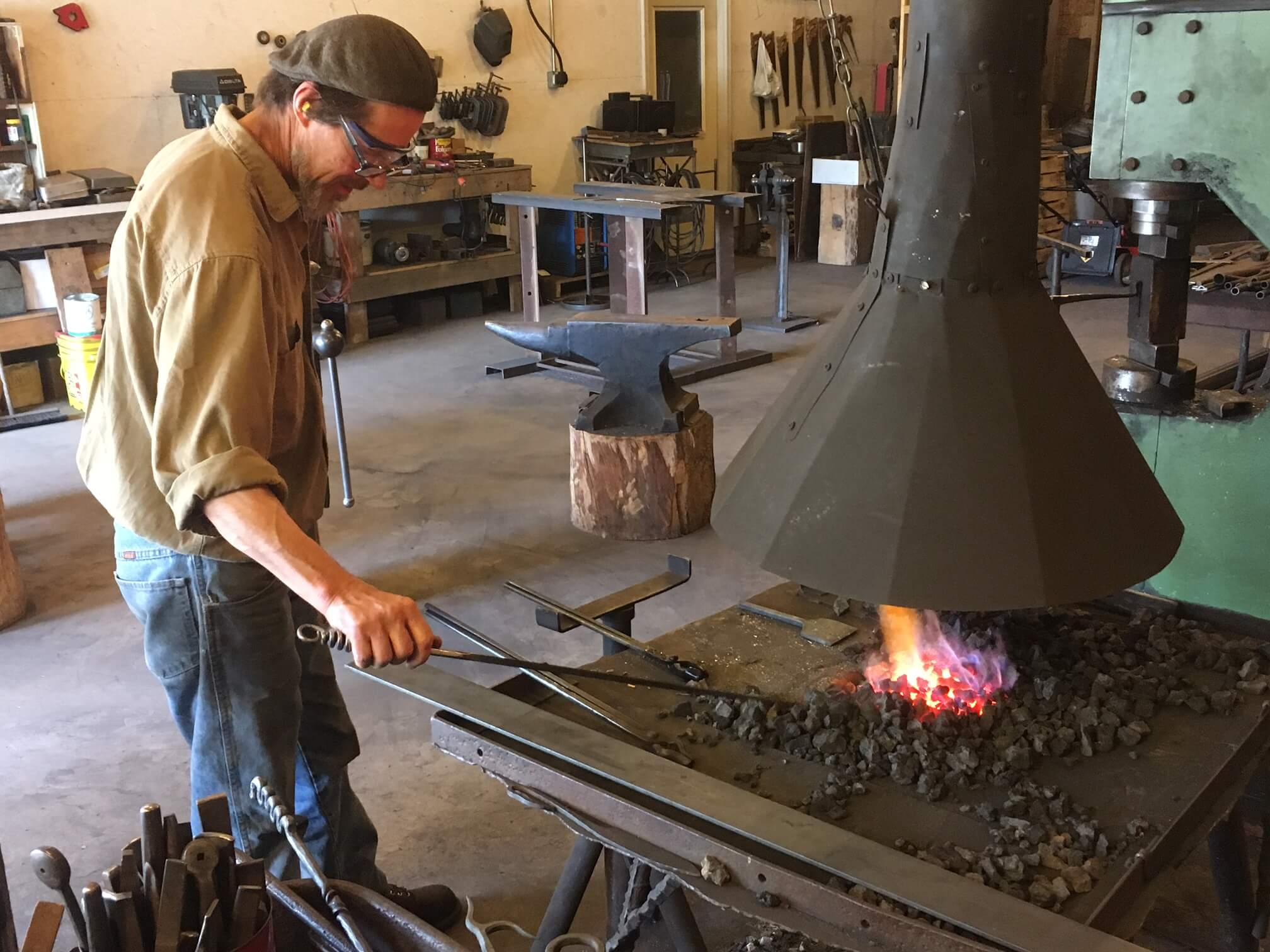
Gordon never did take to normal schooling. “I didn’t hate school but to me it just seemed like a place you had to go for six hours a day because it was necessary,” he says.
Once out of high school, he tried a couple of semesters at Southern Technical Institute in Marietta, Georgia, studying industrial technology, but his attention wandered elsewhere.
He took jobs in a foundry and at a roofing company.
“I was looking for what I wanted to do in life,” he explains. He takes the rod out of the coals, lays it on the anvil, lifts the hammer, and starts banging away on it, with uncanny precision. The hammering echoes throughout the warehouse. The rod grudgingly starts bending to its new shape.
The big change in his life came in his early twenties. His sister married a man from the Upper Peninsula, Gordon came up to visit them, and found a place more suited to his personality.
“I wanted to flee the summers of Atlanta, all the development and all the people,” he says, as he pauses in his hammering. “And I really liked it here.”
Then the breakthrough arrived. He enrolled at NMU, again with focus on industrial technology, and discovered a blacksmithing class with Dale Wedig. He was sold.
The handcrafts and self-sufficiency movements of the Seventies had brought blacksmithing back into vogue in the United States and Gordon realized this was what he wanted to do with his life.
He opened his own blacksmithing shop for five years on Presque Isle Avenue, he traveled to shows and festivals, he got commission work, he acquired a reputation.
But was he getting wealthy and comfortable? No, that wasn’t the lot of a modern day blacksmith. “I’m not sure how I got by sometimes,” he says with a chuckle. “It was a struggle. I was living really cheaply.”
He attempted a family, had a son but “Things just didn’t work out” with the mother. He’s never married. He’s not comfortable talking about it.
After some traveling, he eventually resettled in Marquette and worked out of Wedig’s shop for several years before acquiring his own, the one where he works today. Him, his hammer, his forge, his anvil, and his metals.
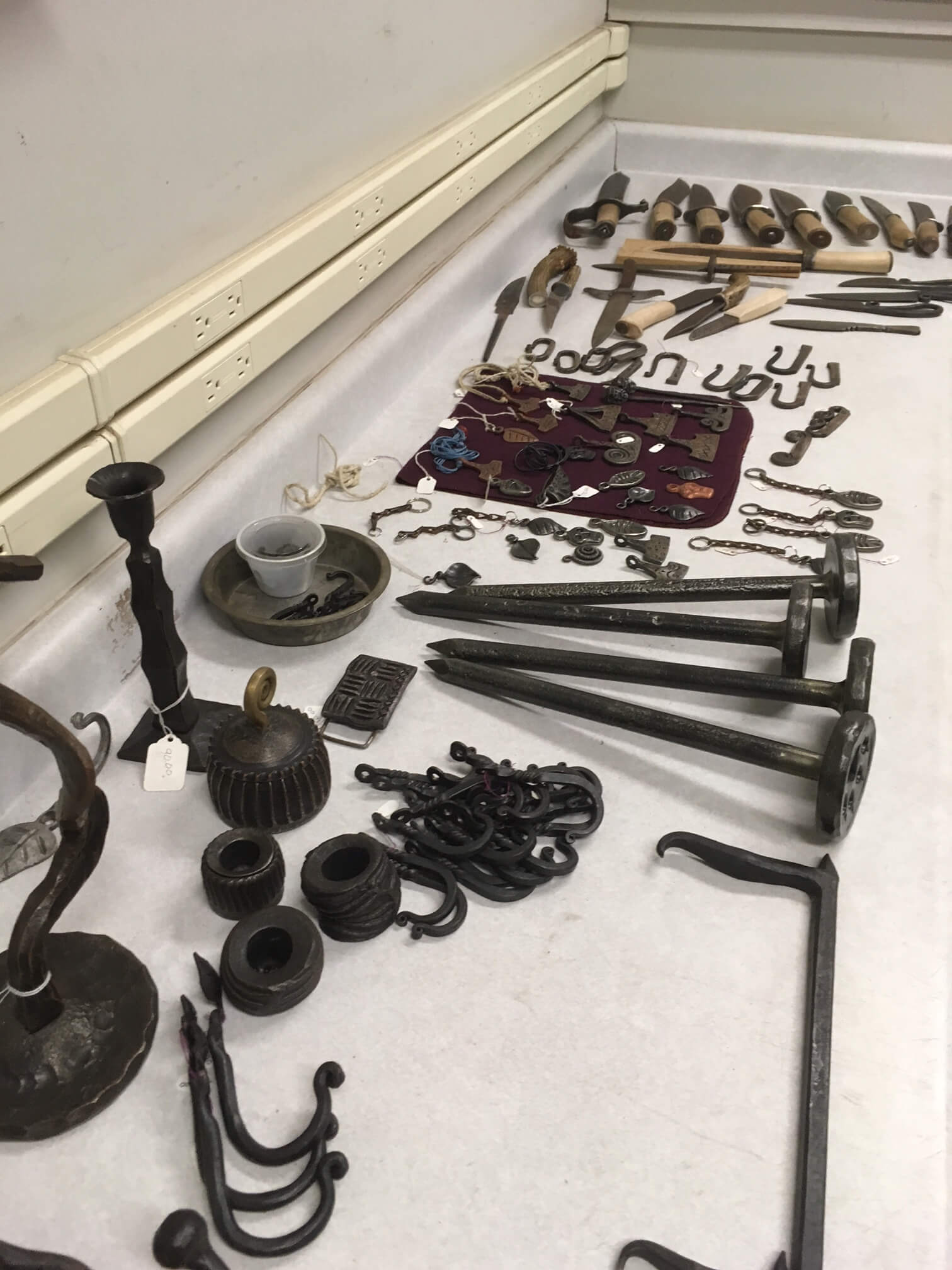
His clients rave about his work–the door handles, the buckles, the knives, the spikes, the hooks, the decorative works large and small–and he still loves what he does, but as the years accumulate and he evolves from vigorous, youthful adulthood to middle age to…eventual elder status, he pauses for reflection. And concern.
“I’m living near the bottom of the socio-economic strata,” he tells you. “I have no health insurance or retirement plan, and as I get older, it’s starting to worry me. I smoke, I inhale metallic dust every day.” He takes a drag on his cigarette. “But you know, I’m willing to take the consequences of the way I live. I’ll do it until I can’t do it anymore.”
Gearhart’s chosen a path that few of us have dared to take. No security, not much money. An avoidance of modern technology. A deliberate decision to live simply in a complex and frenetic world.
He wouldn’t have it any other way.
“I like discovering ways to shape metals into something–a snowflake, a bird, a flower,” he says, laying his cigarette down. “It fascinates me. That’s what I love.”
And then he lifts his hammer for another mighty swing.
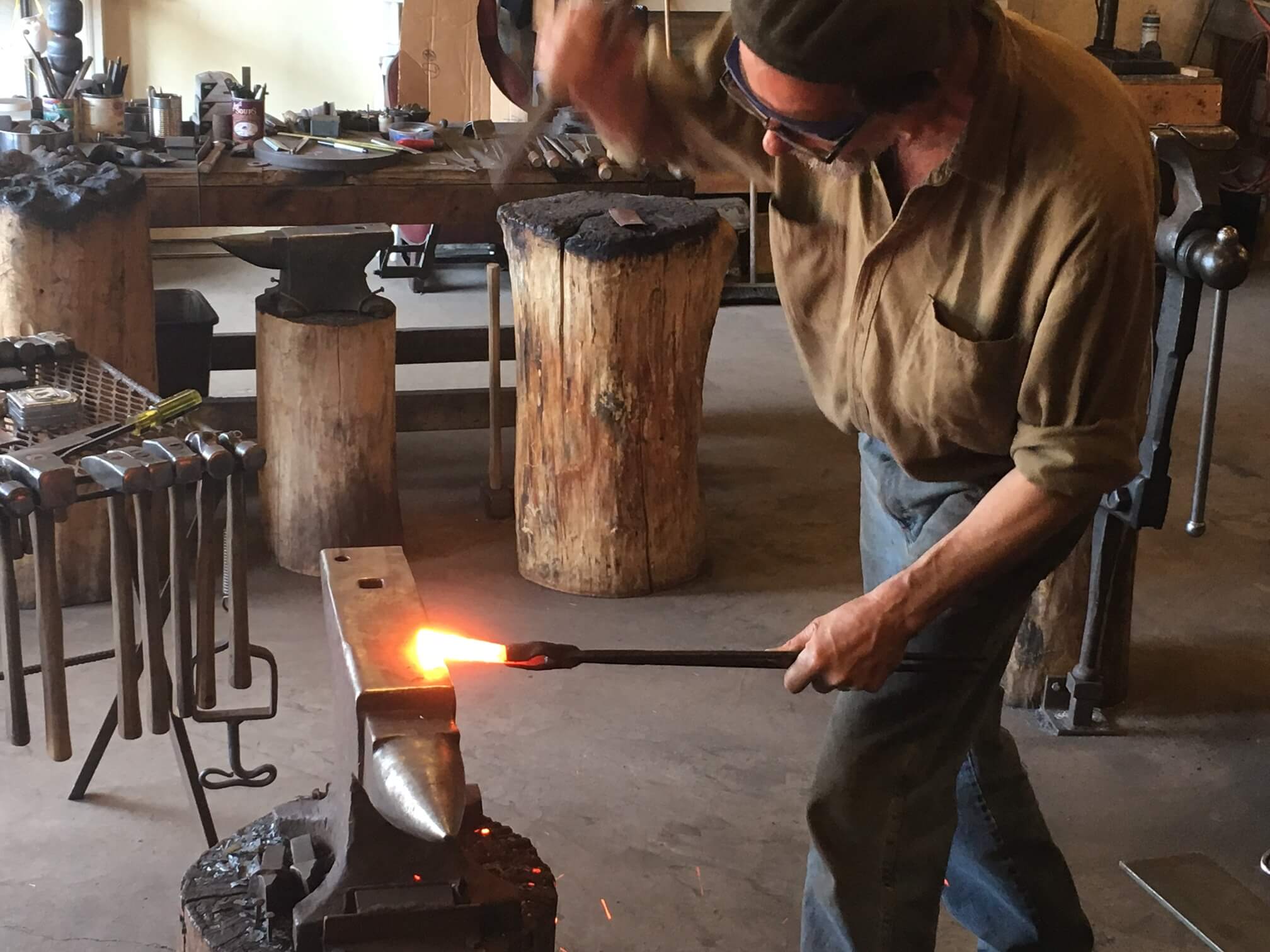
You got news? Email me at briancabell@gmail.com


